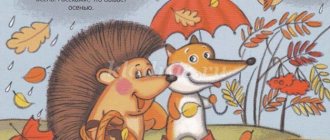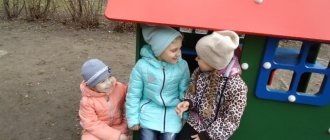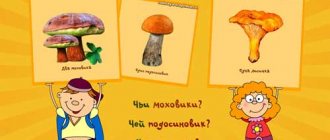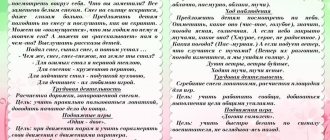Didactic materials on the topic: Autumn for kindergarten
Didactic material for consolidation on the lexical topic: “Autumn.”
Author: Meshcheryakova Svetlana Gennadievna, teacher - speech therapist MKOU Sh-I No. 8, Gremyachinsk, Perm region. Purpose: Generalization of students’ knowledge about the season - autumn. Objectives: Develop coherent speech, communication skills, auditory and visual attention, thinking; Improve the grammatical structure of speech; Cultivate curiosity. Description: It is known that good command of speech plays a significant role not only in everyday life, but also in a person’s professional activity. A person who is an interesting conversationalist and can effectively and clearly express his thoughts makes a more pleasant impression on others. Good command of your native language and speech is an art that needs to be learned. Why is it necessary to develop oral speech? - Be able to communicate with different people in different situations - Express your thoughts and feelings - Speak beautifully, correctly and pleasantly for listeners. Speech serves as a source of knowledge about the world around us, a means of communication and mutual understanding. In this regard, children’s ability to use speech becomes important. Every child feels the need to communicate. The need for communication is one of the most important in human life. When entering into relationships with the world around us, we communicate information about ourselves, in return we receive information that interests us, analyze it and plan our activities based on this analysis. And, of course, children want to be understood. Children often have difficulty describing people, objects, and phenomena. Even despite a sufficient vocabulary, most children do not know how to speak correctly, it is difficult for them to formulate their thoughts, they cannot fully participate in a conversation or conduct a dialogue. The formation of coherent speech is the main task of speech education. Good speech is an important condition for the development of a child’s personality. A didactic game is an excellent learning and development tool used in mastering any program material. Specially selected games and exercises make it possible to have a beneficial effect on all components of speech. In the game, the child gets the opportunity to enrich and consolidate vocabulary, form grammatical categories, develop coherent speech, expand knowledge about the world around him, develop verbal creativity, and develop communication skills. The proposed tasks are aimed at consolidating material on the lexical topic: “Autumn”. This is a kind of homework that is interesting to do with children after a speech therapy session at home, during a walk. The material will be useful to educators, primary school teachers, parents, and speech therapists. Assignment:
“Read, add, make sentences.”
Assignment:
“Place the words in order, make the correct sentence.”
Boots, rubber boots, footwear.
(Rubber boots are shoes)
Assignment:
“Favorite poems”
Listen to the poem.
Find offers. Read it expressively. In order to let children feel the beauty of the poetic word, an adult himself must feel it and be able to convey it in his performance.
You cannot read the work monotonously, inexpressively. Autumn.
The lingonberries are ripening. The days have become colder, And the cry of birds only makes my heart sadder. Flocks of birds fly away, away across the blue sea. All the trees shine in a multi-colored dress. The sun laughs less often, There is no incense in the flowers. Soon Autumn will wake up and cry awake.
Autumn.
A golden leaf is already covering the wet ground in the forest... I boldly trample with my foot the outer beauty of the forest. My cheeks are burning from the cold: I love to run in the forest, Hear the branches crack, Rake up the leaves with my foot!.. (A. N. Maikov)
Assignment: Read the poem. Come up with a name.
Task:
“Let’s clarify the signs”
Tell us what is typical for each autumn month? How is autumn different from summer?
Coordination of adjectives with nouns:
Task: Select epithets for the words: sun, sky, day, weather, trees, grass, animals, birds, insects.
Task: Find antonyms for the words: warm - cold, cloudy day - sunny day, dry - wet, long - short. Assignment:
“Say a tongue twister.”
First, say the tongue twister out loud slowly twice. Now to myself several times - at first slowly, then faster and faster. Learn to quickly pronounce tongue twisters out loud.
“All the maples have become red, And not a single one is teasing: Since everyone is red anyway, Who cares!”
Assignment:
“Learning to answer questions”
Depending on what task you set for the child, this is the answer you require: complete or short.
After reading the text, the answers can be full and meaningful. The question must be constructed competently and clearly so that the child is not distracted by extraneous details. Listen to the story.
Tell me, what time of year are we talking about? Look at the pictures, which one matches the story? It is important that the text read by adults is an example of the correct literary construction of a sentence, that it is bright and expressive.
Autumn
Autumn comes after summer. Gradually the days become cloudier, the sun shines less and less. The sky is covered with gray clouds. It often rains – long, drizzling rains. The leaves on the trees turn yellow and fall off. A cold wind tears leaves from tree branches, and they fall to the ground, covering it with a golden carpet. The grass is withering. It's damp and slushy outside. The birds don't sing anymore. They hide from the rain, gather in flocks and fly far to warmer climes. You can’t go outside without an umbrella, you’ll get wet. And it’s cold without a jacket and boots.
Multi-colored boats.
I came to the pond.
How many colorful boats are on the pond today: yellow, red, orange! They all arrived here by air. A boat will arrive, land on the water and immediately set sail. Many more will arrive today, and tomorrow, and the day after tomorrow. And then the boats will run out. And the pond will freeze. (D.N. Kaigorodov) Tell me what kind of boats float on the pond. What time of year do these boats happen? Color this picture and make up a story based on it. Share your impressions of autumn. Ask, how do you feel about autumn? Start your story with these words: I love autumn because... I don’t like autumn because...
Make up a story according to plan: “Day of Knowledge!”
Assignment: “What autumn gave us.” Words are helpers: garden, fruits, vegetables, vegetable garden, harvesting, harvest, mushrooms, baskets, forest, collect, ripened, harvest.
Game: “What grows in the garden?” Remember what grows in the garden. What grows in the garden? Look at the pictures, first name all the vegetables, then all the berries and finally all the fruits. Answer the questions and explain why there are several correct answers to the same question.
Game: “I cook myself” Show and name the vegetables from which borscht soup is made, and fruits for compote. We will cook borscht from... We will cook compote from...
Game: “I come up with a color” The names of some colors come from the names of words - objects. Let's come up with flower names together. Salad (what color?) – lettuce. Lingonberry (what color?) – lingonberry. Beetroot (what color?) – beetroot. Walnut (what color?) – nut. Carrots (what color?) – carrot. Plum (what color?) – plum. Game: “What kinds of juices are there?” What are these juices called? Apple juice – apple juice. Grape juice – grape juice. Carrot juice – carrot juice. Tomato juice – tomato juice. Cucumber juice – cucumber juice. Plum juice – plum juice. Cabbage juice – cabbage juice. Potato juice – potato juice. Cranberry juice - ... Pear juice - ... Assignment:
“Remember the proverb.”
Read the proverbs and explain how you understand them.
There is no turn from autumn to summer. Summer with sheaves, autumn with pies. In autumn, a gray morning, a red day.
Game: “What’s extra” Listen and guess which of the listed items is extra. Give a clear, complete answer. Start with these words: “I think I’m superfluous...” Chanterelle, porcini mushroom, fly agaric, boletus. Apple, pear, lemon, tomato. Sparrow, swallow, stork, heron, wagtail. Umbrella, jacket, hat, gloves, scarf. Provided you practice regularly, the results will not be long in coming.
We recommend watching:
Scenario for autumn fun in kindergarten. Middle-senior group Poems on an autumn theme for children 5-7 years old Autumn riddles for children 4-5 years old in kindergarten with answers Autumn changes in nature for preschoolers
Similar articles:
Outdoor games for a walk in the younger group in the fall
Autumn festival in kindergarten. Scenario
Outdoor games for children of the preparatory group indoors
Morning exercises in the middle group. October
About the month of November for children
Didactic games “Autumn” in the middle group
In the middle group, games should expand thematic vocabulary, consolidate ideas about autumn processes and phenomena, develop concentration and thinking abilities.
The animals are stocking up
The game introduces them to the world around them; preschoolers develop an idea of what animals eat in the wild. For the game, prepare images of forest animals, as well as their food: plants, nuts, mushrooms.
Pair or individual game. Children take turns taking a picture of food and saying that they see in the picture which animal eats it. Then they put the image on the picture of a suitable animal.
Autumn
The purpose of the didactic game “Autumn” is to form and consolidate an idea of what natural phenomena are considered autumn, and to expand the thematic vocabulary.
For the game, prepare pictures that depict scenes that take place in different seasons of the year: falling snow, rain and puddles, yellow trees, bright sun, snowmen, blooming flowers, children on skis, starlings in birdhouses, etc. Lay out the images in front of the student and ask them to choose pictures in which actions can only take place in the fall.
Which tree is the leaf from?
The game broadens your horizons and teaches you to recognize different types of trees by their leaves. Preschoolers learn to form adjectives, they develop speech skills, memory and concentration. To play, cut out realistic images of autumn leaves from thick paper. If there are many different types of trees in the kindergarten yard, you can collect real leaves.
Place the collected leaves in a box. Children take turns taking a leaf out of it, looking at it, trying to find out what tree it comes from. First they name the tree, then form the corresponding adjective. For example: “This is an aspen leaf. This is an aspen leaf."
Didactic games on the theme “Autumn” in the preparatory group
In the preparatory group, preschoolers prepare to enter school, receive basic philological, mathematical and natural history knowledge, learn to analyze and construct sentences correctly.
Favorite autumn
Invite the students to tell how they feel about autumn, why they love it, and what they don’t like about this time of year. Answers should be detailed and begin with the following phrases:
- for me autumn is...;
- I like autumn because...;
- I don't like autumn because...
One or more
The game develops the skill of forming words in the plural. The presenter says a phrase, and the players change it. Here are examples:
- a rainy day has come - rainy days have come;
- a gray cloud hangs - gray clouds hang;
- light rain began to fall; light rain began to fall;
- a cold wind blew - cold winds blew;
- a leaf falls from a tree - leaves fall from trees;
- the day has become short - the days have become short;
- the bear lies down in a den - bears lie down in a den;
- the flock of cranes flew away - the flocks of cranes flew away.
Describe it beautifully
The presenter calls the word, and the players take turns listing suitable epithets:
- autumn – rainy, golden, clear, fine, cloudy, late, warm;
- the forest is motley, quiet, bare, sad, yellowed, dark;
- trees - yellow, golden, red, red, bare, multi-colored, bright, beautiful;
- foliage - fallen, yellowed, withered, wet, golden, brown, withered.
The game teaches you to select adjectives for nouns and develops your imagination.
Didactic games “Autumn” in the younger group
We offer simple educational games that will help younger preschoolers get acquainted with autumn.
Apples and leaves
For the game, prepare a table with 2 cells: label the first “apples”, the second – “leaves”. Also cut out images of apples and autumn leaves in different shapes, colors and sizes. Ask the student to correctly distribute the objects into cells.
Arrange the leaves by size
To play, cut out images of autumn leaves in 3 sizes: large, medium and small. Make a table with 3 matching cells. Ask your child to sort the images into cells.
Autumn
This is a finger game. Here is the accompanying text for it:
A cold breeze blew, the children blew air through their mouths;
He instantly blew the leaves off the branches. – move their fingers in different directions, blow on them;
The leaves are falling, spinning,
They lie down quietly on the grass. – smoothly swing their arms;
The rain has wet the leaves, - with the fingers of the left hand they tap on the palm of the right, then vice versa;
The hail has punched holes in them; the fingers of one hand, clenched into a pinch, are knocking on the palm of the other;
And the frost grabbed them - they knock with the fist of one hand on the palm of the other;
And the snow fell. – slowly and smoothly move the brushes up and down.





